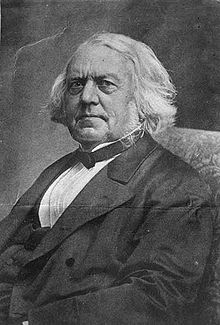De Nationalliberale



De Nationalliberale ( Danish for "The Nationalliberals ") were a trend in Danish politics from 1842–82 . They were seen as a "group" but had no party organization.
history
The trend arose when Orla Lehmann formulated the eider policy in 1842 . Right from the start, the National Liberals were joined by a group called yngre liberale (“Younger Liberals”), including Carl Ploug , editor of the newspaper Fædrelandet for decades, and DG Monrad , the father of the Danish Basic Law of 1849 . Carl Christian Hall and Andreas Frederik Krieger later joined the company as leaders. These men were all born around 1810.
The current emerged among students and academics and was therefore often called the "professors' party". In the 1840s, the party was particularly popular among merchants and younger civil servants. In opposition to absolutism , the National Liberals called for a free constitution . They were supporters of Scandinavianism and Eider politics.
As late as 1840, most peasants were still behind absolutism. By founding Bondevennernes Selskab ("Society of Farmers' Friends") in 1846, the National Liberals were able to successfully win over the farmers for the struggle for the constitution. However, the alliance was shaky as early as 1848.
The National Liberals played a leading role in the March Revolution in Denmark in 1848. The “ March Ministry ” was a coalition government made up of the National Liberals and rather conservative personalities. In autumn 1848 the National Liberals were ousted from the government and the conservative “ November Ministry ” was formed.
The constituent imperial assembly ( Den grundlovgivende rigsforsamling ) 1848-49 consisted of three almost equally large directions:
- The conservative Højre
- The National Liberals
- The peasant friends (see above), who then broke with the National Liberals and later formed the Venstre
A point of contention in the Reich Assembly was the composition of the new Reichstag. The farmer friends wanted a unicameral system with universal suffrage. The Højre wanted a bicameral system with privileged voting rights. The decisive factor was the National Liberals in the middle, who joined a compromise proposal that provided for two chambers with universal suffrage for the Folketing and privileged suffrage for the Landsting . The National Liberals also had a decisive influence on the June Basic Law of 1849 on other points.
1849-1857 received only a few National Liberal ministerial posts in the conservative governments. That was to change in 1857 when Carl Christian Hall formed a national liberal government that lasted until December 31, 1863 with a brief interruption. This period was the height of the National Liberals in pushing through many of the reforms they called for in the 1840s.
When Hall took up the eider policy again in 1863, a national drama began. The November Constitution triggered the German-Danish War of 1864 . As a result, Denmark lost the duchies of Schleswig , Holstein and Lauenburg to Prussia . The National Liberals were blamed, and they lost prestige and ministerial posts. DG Monrad even emigrated to New Zealand .
In 1865, Christian Emil Krag-Juel-Vind-Frijs , the leader of the Nationale Godsejere ("National Landowners") formed the government. The landowners were to provide the Danish prime ministers for decades. With the constitutional amendment of 1866, they also gained decisive influence in the Landsting.
The National Liberals tried to form an alliance with the landlords and were able to regain influence. This coalition only broke up in 1875 when Jacob Brønnum Scavenius Estrup formed a purely landowner government.
An urgently needed generation change among the National Liberals was missed in 1866 when the Mellempartiet was formed. Until the dissolution of the National Liberals, they were shaped by the men from the founding generation.
The constitutional struggle that shaped Danish politics at the end of the 19th century was not wanted by the National Liberals. They disbanded in 1882 and most of the members went to Højre , while DG Monrad turned to Venstre .
The National Liberals had a significant influence on public opinion and the cultural life that was shaped by national romanticism. Only Viggo Hørup von Venstre created a strong opposition to it. With the support of the circle around Georg Brandes, he succeeds in reducing the national romantic influence.
See also
- National Liberal Party (Germany)